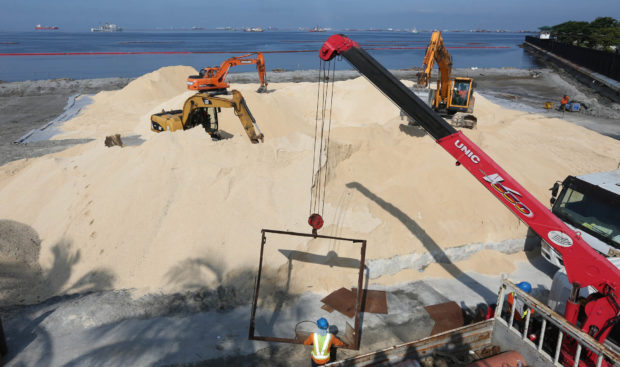Permit issued to ship Cebu rocks for Manila Bay rehab – MGB in Central Visayas
CEBU CITY, Cebu, Philippines — The Central Visayas office of the Mines and Geosciences Bureau (MGB- ) on Saturday said it had issued a permit to transport dolomite from Cebu province for the Manila Bay rehabilitation project, in response to questions raised by local officials who said they were left in the dark about the extraction and shipment of the rocks.
In a statement, MGB 7 Director Loreto Alburo said his office issued an ore transport permit on Aug. 26 to deliver at least 3,500 wet metric tons of dolomite rocks from Alcoy town in southern Cebu to the Manila Integrated Cargo Terminal in Manila.
“This dolomite shipment is the reported ‘white sand’ which had been spread along the shorelines of Manila Bay to enhance the aesthetic beauty of the bayfront,” Alburo said.
Dolomite Mining Corp. (DMC) quarried the dolomite at Barangay Pugalo in Alcoy, he added.
“The raw dolomite quarried by DMC was delivered to its sole buyer, the Philippine Mining Service Corp. (PMSC) for processing to various desired sizes and marketable products,” the regional office said.
The PMSC-Alcoy Plant has an existing mineral processing permit from the MGB and is currently on its second five-year term which will expire in 2023.
Article continues after this advertisementMGB 7 said dolomite products in Alcoy are regularly marketed to several buyers here and abroad, such as Taiwan and Japan. Locally, the dolomites in Cebu are shipped to Misamis Oriental, Pasig City, Davao City, Manila and other cities in Cebu.
Article continues after this advertisement“The dolomite materials sourced from Cebu have been extracted, produced and shipped out to various buyers following proper regulatory laws and procedures,” Alburo said.

FROM CEBU TO MANILA Workers continue to pour sand composed of crushed dolomite from Cebu province over the shores of historic Manila Bay. The rehabilitation project has drawn controversy over its cost as well as environmental concerns. —MARIANNE BERMUDEZ
Minable deposits
The MGB 7 statement sought to address some of the questions that were left unanswered for two days after an official of the Department of Environment and Natural Resources (DENR) announced that a section of Manila Bay would be covered with “white sand” as part of its rehabilitation.
Environment Undersecretary Benny Antiporda later clarified that the sand was actually pulverized dolomite sourced from Cebu.
The Cebu Provincial Board on Friday questioned how the dolomite was transported out of the province without the knowledge of the local government.
Alburo said Cebu was one of the few provinces in the country that have economically minable deposits of dolomite. The main deposits are found between Alcoy and Dalaguete towns, he said.
Overpriced?
The towns of Alcoy, Dalaguete, Oslob and Boljoon are known for its white sand beaches.
Alcoy, about 90 kilometers south of Cebu City, is a fifth-class municipality with an annual income of at least P25 million.
Also on Saturday, a nongovernmental organization which monitors public infrastructure projects said the Manila Bay “beach nourishment” project could be overpriced by as much as 55 percent.
Terry Ridon, convenor of Infrawatch PH, said the approved budget of the Manila Bay Rehabilitation Program was P397.897 million.
Infrawatch PH, on its Facebook page, said the exact figure was P397,897,376.62, citing as its source Supplemental Bulletin No. 1 of the Department of Public Works and Highways (DPWH).
Antiporda earlier said the project cost P349 million, but later issued a correction and placed the cost at P389 million.
“For this project,’’ Ridon said, “the bulk of the work are earthworks, particularly backfilling. There are no other major works for this project except earthworks.”
Citing the DPWH’s own backfilling cost estimate, he said the typical unit cost of backfilling work is “around P442.89 per cubic meter,” which he rounded to P500 per cubic meter “for simplicity.”
Since “[t]he project requires a total of 164,700 cubic meters of sand,” Ridon said, that total multiplied by P500 equals the cost of P82,350,000.”
Estimated price
He then estimated the price of dolomite at P600 per cubic meter. “Using the 2017 Mines and Geosciences Bureau pricing of dolomite at P600 per cubic meter, the total price of 164,700 units of dolomite is P98,820,000,” he added
“Adding the cost of backfill work and dolomite units yields a baseline total project cost of P181,170,000, Ridon said. Further, he pointed out, subtracting that total “from the approved budget yields P216,727,376.62 … [or] a gross margin of 54.47 percent.”
Ridon said the “DPWH [only] allows a profit margin of only 8 percent of a project’s estimated direct costs.”
“Unless fully disclosed and clarified by the DENR, the estimated project return of the Manila Bay white sand project could reach a staggering 55 percent of its approved budget,” he said.
No plan to stop
In an Inquirer interview, Antiporda reiterated on Saturday that his department had no plans to stop the project despite mounting criticism from netizens and environmentalists.
He said the DENR and the DPWH had placed “interventions” to keep the transported sand in place. “Many have said it will wash away and we cannot change nature’s forces. Of course, there is a possibility that some [of the sand] will be washed away, but we have put in engineering interventions for the project. We have put geotubes,” Antiporda said.
Geotubes, or geotextile tubes, are large, specially made cloth bags that help prevent erosion, according to Geofabrics, a company that produces these materials. Apart from helping prevent shoreline erosion, they are also used for land reclamation, island creation, wetlands creation and other such constructions.
For more news about the novel coronavirus click here.
What you need to know about Coronavirus.
For more information on COVID-19, call the DOH Hotline: (02) 86517800 local 1149/1150.
The Inquirer Foundation supports our healthcare frontliners and is still accepting cash donations to be deposited at Banco de Oro (BDO) current account #007960018860 or donate through PayMaya using this link.